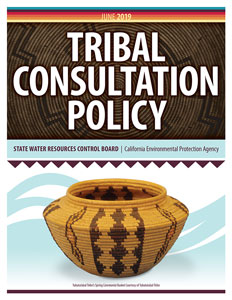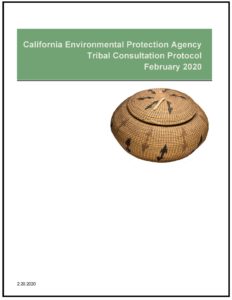
Tribal Consultations
The California Water Boards are committed to strengthening communication, transparency, and respectful government-to-government relationships with California Native American tribes. Recognizing the inherent sovereignty of California Native American tribes, we strive to ensure that tribal voices, knowledge, and priorities are meaningfully included in our work to protect and manage Californians water resources.
In June 2019, the Water Boards finalized the Tribal Consultation Policy, which affirms our responsibility to consult directly with California Native American tribes on policies, projects, and actions that may affect tribal rights, resources or interests.
In early 2025, the Water Boards began revising the Tribal Consultation policy to strengthen and improve consultation practices. This ongoing effort reaffirms the agency’s commitment to government-to-government consultation with California Native American tribes and to building partnerships rooted in respect, collaboration, and share stewardship of Californias water resources. Learn more about the Tribal Consultation and Engagement Policy and Tribal Consultation and Engagement Protocol Project.
Consultation
Consultation is a meaningful and timely process of seeking, discussing, and considering carefully the views of others, in a manner that is cognizant of all parties’ cultural values and, where feasible, seeking agreement. Consultation between government agencies and California Native American Tribes shall be conducted in a way that is mutually respectful of each party’s sovereignty. Consultation shall also recognize a Tribes’ potential needs for confidentiality with respect to places that have traditional tribal cultural significance.
The Water Boards’ Tribal Liaison is responsible for coordinating outreach, communication and consultation efforts with the Water Boards and Tribes. For inquiries regarding consultation, please contact: Tribal-Liaison@waterboards.ca.gov.
Tribal Consultation Dashboard
Relevent Policies
Water Boards' Tribal Consultation Policy Statement
The California Water Boards Tribal Consultation Policy (policy) is to develop effective communication with all California Native American Tribes that allows for meaningful participation and input while developing or revising the Water Boards’ regulations, rules, policies, programs or plans that may impact Tribes. It is the intent of this policy to establish the guiding principles to consult with California Native American Tribes on a government-to-government basis when requested and deemed to be appropriate through discussion with the requesting tribe(s), or as required by statute (e.g. Assembly Bill 52 and Section 106 National Historic Preservation Act).
CalEPA Tribal Consultation Protocol Purpose
The purpose of this Tribal Consultation Protocol (Protocol) is to establish a step-by-step process that will assist the California Environmental Protection Agency (CalEPA) and each of its boards, departments, and office, in engaging with California Native American Tribes (Tribes) broadly and in government-to-government consultations. The Protocol builds upon CalEPA’s 2015 update to its Tribal Consultation Policy by providing CalEPA, its boards, departments, and office, with a process for determining which, if any, Tribes or tribal communities their actions might affect. The Protocol establishes a set of best practices for CalEPA to use when engaging with Tribes regarding the potential effects its actions and the actions of its boards, departments, and office might cause, in a meaningful, inclusive, and mutually respectful way.
California Tribal Consultation Policies
The Water Boards Tribal Consultation Policy states the following:
The Water Boards will consider, review and adhere, when appropriate, to a Tribes’ own consultation policy if provided, before initiating consultation with that Tribe.
Currently, the Water Boards’ know of three California Native American Tribes that have their own consultation policy. If your Tribal government has their own consultation policy, we kindly request that you send it to Tribal-Liaison@waterboards.ca.gov.
Process in which California Tribes can Request to be Notified of Water Boards’ CEQA Lead Projects (per AB 52)
On September 25, 2014 Governor Brown signed Assembly Bill No. 52, which created a new category of environmental resources, Tribal Cultural Resources, that must be considered under the California Environmental Quality Act (CEQA). AB 52 also created new requirements for consultation with Tribal governments regarding projects that may affect a Tribal Cultural Resource.
We encourage California Native American Tribes to request to be notified of Water Boards CEQA lead projects.
- 1) Consistent with the government to government process, we request that your request to be placed on our AB 52 List is submitted on formal letterhead from your Tribal leadership, in writing, and mailed to:
Tribal Liaison
State Water Resources Control Board
1001 I Street
P.O. Box 100
Sacramento, CA 95814
Tribal-Liaison@waterboards.ca.gov - 2) We also kindly request that you provide us with maps or a way for our agency to be aware of the geographic area that is traditionally and culturally affiliated with your Tribe.
- 3) Lastly, we kindly request that your Tribal leadership designate a lead contact person to receive formal notification of proposed projects.
A Tribe’s request to be notified of Water Boards CEQA lead projects (per AB 52) will be interpreted as a notification request for both the State Water Board and any geographically appropriate Regional Water Boards.
California Tribes Requesting to be Notified of Water Boards’ CEQA Lead Projects (per AB 52)
The following list includes Tribes that are currently receiving notification of Water Boards’ CEQA lead projects:
- To narrow the list of Tribes, use the search box below. You may use both letters and numbers.
- To display the entire table, clear the search box.
- To sort the table based on a column, click the column heading you would like to sort by.
| Tribe (Sortable) |
Area Affiliation by County (Sortable) |
|---|---|
| Shingle Springs Band of Miwok Indians | Amador, El Dorado, Placer, Sacramento, Sutter, Yolo, Yuba |
| Mishewal Wappo Tribe of Alexander Valley | Lake, Napa, Sonoma |
| Wilton Rancheria | Alameda, Alpine, Amador, Contra Costa, El Dorado, Mono, Nevada, Placer, Sacramento, San Joaquin, Solano, Stanislaus, Sutter, Yolo, Yuba |
| Colorado River Indian Tribes | Imperial, Riverside, San Bernardino |
| Elk Valley Rancheria | Del Norte |
| Ohlone/Costanoan-Esselen Nation | Monterey |
| Wiyot Tribe | Humboldt |
| Federated Indians of Graton Rancheria | Marin, Sonoma |
| Winnemem Wintu Tribe | Shasta, Siskyou |
| United Auburn Indian Community | Amador, El Dorado, Nevada, Placer, Sacramento, Sutter and Yuba. Portions of Butte, Plumas, San Joaquin, Sierra, Solano and Yolo. |
| San Luis Rey Band of Mission Indians | Orange, Riverside, San Diego |
| Yurok Tribe | Del Norte, Humboldt |
| Torres Martinez Desert Cahuilla Indians | Imperial, Riverside, San Bernardino, San Diego |
| Cher-Ae Heights Indian Community of the Trinidad Rancheria | Humboldt County |
| Middletown Rancheria | Lake |
| Barona Band of Mission Indians | San Diego |
| Gabrieleño Band of Mission Indians- Kizh Nation | Los Angeles, Orange, Riverside |
| Santa Rosa Rancheria Tachi Tribe | Fresno, Kern, Kings, Merced, Monterey, San Benito, San Luis Obispo, Tulare |
| Shasta Indian Nation | Humboldt, Shasta, Siskiyou, Trinity |
| Gabrieleno Tongva San Gabriel Band of Mission Indian | Los Angeles, Orange, Riverside, San Bernardino, Ventura |
| Blue Lake Rancheria | Humboldt |
| Big Pine Paiute Tribe of the Owens Valley | Inyo, Mono, Northern San Bernardino, Northeast Kern |
| San Manuel Band of Mission Indians | San Bernardino, southeast Kern, eastern Los Angeles, northwestern Riverside County |
| Pit River Tribe | Modoc, Siskiyou, Shasta and Lassen |
| Viejas Band of Kumeyaay Indians | San Diego and Imperial Counties |
| Karuk Tribe | Siskiyou, Del Norte, Humboldt |
| Buena Vista Rancheria Me-Wuk Indians | Amador, Calaveras, El Dorado, Placer, Sacramento, and San Joaquin Counties |
| Tolowa Dee-ni’ Nation | Del Norte |
| Morongo Band of Mission Indians | Riverside, San Bernardino |
| Pala Band of Mission Indians | San Diego, Riverside, Orange, Los Angeles, San Bernardino |
| Chicken Ranch Rancheria of Me-Wuk Indians | Tuolumne, Calaveras |
| Fort Yuma Quechan Tribe | Imperial, Kern, Los Angeles, Riverside, San Bernardino, San Diego |
| Yocha Dehe Wintun Nation | Colusa, Lake, Napa, Sacramento, Solano, Sutter, Yolo |
| Habematolel Pomo of Upper Lake | Lake and Mendocino |
| Tamien Nation | Alameda, San Mateo, Santa Clara, Santa Cruz, Stanislaus |
| Rincon Band of Luiseño Indians | Los Angeles, Orange, Riverside, San Bernardino, San Diego, Santa Barbara, Ventura |
| Bear River Band of the Rohnerville Rancheria | Humboldt, Mendocino, Trinity |
| Enterprise Rancheria Estom Yumeka Maidu | Butte, Plumas, Yuba |




